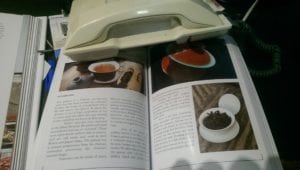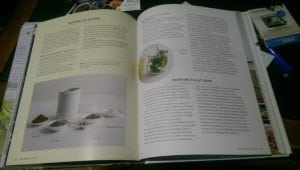I read a lot.
I read surprising few books on tea. Of course, I’ve read my own a few times, and in the case of The Infusiast, should have read it a few more times before I okayed the print run with “1939” occurring twice where it should have been ‘1839’.
I love novels that are set around tea, and some non-fiction with the same premise, but I find most tea books… boring. Not deliberately so, but because I already know most of the facts and stats, and also some of the outrageous lies they peddle, such as claiming that gyokuro is drinkable, and just dross like the perfect measurements for the rush matting that goes under one’s backside as one contemplates a twig in a vase and praises the host’s ability to pour grassy tea to occupy precisely 63.26756% of a tea cup formed from the right type of clay on a Sunday during a full moon.
I love Sarah Rose’s All The Tea in China (despite the flagrant nationalism of the cover shenanigans ) and my favourite of all is Liquid Jade by Beatrice Hohenegger, despite the inconvenience of having to look up the spelling of her surname every time I mention it.
Anyway, I have just read two books back to back. One is Australian Tea Masters’ “Course in Tea Sommelier” and the second is “World Atlas of Tea: From the Leaf to the Cup, the World’s Teas Explored and Enjoyed” by Krisi Smith, who owns a tea company in the UK.
Note that I bought the former, whereas the latter was provided as a review copy.
Review? Here’s where my appalling manners kick in, of course.
I have a little list, there are only three things on it: three completely untrue ‘facts’ about tea that turn up over and over again. And when they turn up in a tea book, I judge it harshly.
That is not to say that I have not, at one time, believed all three of these “facts”. It’s just that when the time came to write about each of them, I did some actual research – you know, where you go beyond the first page on Google – and found that they were all without foundation.
Let’s see how they went:
Untrue ‘fact’ #1: Anna Russell, The Duchess of Bedford, ‘invented’ Afternoon Tea:
We know this to be untrue as there are historical references to afternoon tea from well before she was born.
- Australian Tea Masters: Describe this as “the accepted legend”. Not a bad way to put it.
- Krisi Smith: Just repeats the story as gospel
Untrue ‘fact’ #2: Richard Blechyden invented iced tea at the World’s Fair of 1904
We know this to be untrue for a variety of reasons. At least three vendors had iced tea on their menus which were printed well in advance of the event. And most damning, an American historian has found newspaper articles from the late 1800s listing the amounts of iced tea drunk by Civil War veterans at a memorial event.
- ATM: Just repeats the story as gospel
- Krisi Smith: Doesn’t mention it
Untrue ‘fact’ #3: Thomas Sullivan accidentally invented the teab*g in 1906 or 1908 by sending out samples in silk bags.
This is the most easily disproved: there are several patents on file with US patent office for variations on a teab*g from as much as a decade earlier
- ATM: Just repeats the story as gospel
- Krisi Smith: Just repeats the story as gospel
So, from that point of view, it’s disappointing. Ms. Smith also describes English Breakfast Tea as “being developed by the British” which is at odds with it’s actual creation in New York City, although arguably you could counter it’s creator was from Hull.
So, with such a poor showing on my own scale of judgement, you are probably thinking I didn’t like either book. Well, here’s a surprise: you’re wrong.
“Course in Tea Sommelier” is written as a textbook. There are comprehensive and detailed notes about tea ceremonies from China, Japan, Korea etc. On how to conduct a professional tasting. ‘Grow Your Own Tea’ and ‘Process Your Own Tea’ are quite a good overview and a bit of surprise inclusion. There’s an appendix of popular teas.

As a textbook, it is found wanting. It has no index. The binding is odd, you can’t get it to stay open while practicing the 74th move of the Korean tea ceremony with a teapot in each hand and a cup balanced on your nose.
Not only should one expect a higher standard of research, it’s also frightfully dull. It’s like a second year engineering student has been asked to find the facts about tea out and write them down. And not done it overly well. C-, please try better next time, and lighten up.
The most alarming aspect though, is that these untruths are being repeated to a new generation of tea enthusiasts.
When it comes to Krisi Smith’s book, though, I have to say: I loved it!

I realise this makes me inconsistent, but what I loved about it was the joy and enjoyment throughout the glossy, well laid out pages. I like it far better than any other large format book I have read on tea, including the universally praised Tea: History, Terroirs, Varieties by Gasgoyne et al, simply because I never once fell asleep whilst reading it.
The “Atlas” section in particular is sumptuous and well researched.
I’m hoping a second edition will quietly sort out the errors (or they could just staple a printed copy of this blog to each copy sold).
It’s easy to snipe from the sidelines (I certainly find it so) and having written several books that also contain errors, I also know the effort that goes in, so I’ll simply put it this way:
Of the two books, the one that needs to be held to a higher standard isn’t the better. And joy and excitement and enjoyment and passion will always win over dull. So I find that I feel like a fool for buying a book that I hate, and like a winner for having scored a review copy of one I love.
Summary:
- Australian Tea Masters: “Course in Tea Sommelier” – 4/10, don’t bother unless you have to for a course
- Krisi Smith,”World Atlas of Tea: From the Leaf to the Cup, the World’s Teas Explored and Enjoyed” – 8/10 for me, 9/10 for people less narrative-loving and more information based than I am (which is nearly everyone)
For once, I totally went without my usual entertaining and witty footnotes. What are you looking down here for?
Comments
2 responses to “Google Is a Lazy Co-Author”
I knew it. Read your blog and you will find the truth.
Thanks for these reviews. It will help if/when I ever come across these books.
I’ve gotten to a point where I’ve considered keeping a damn tally every time a teabook repeats these myths. It doesn’t break a good book, but it does get a good eyeroll at least.